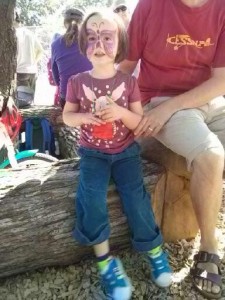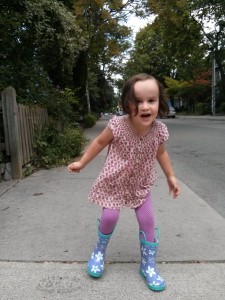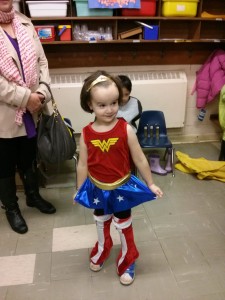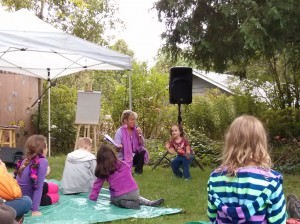 My daughter Harriet is four, and she is a lot like me, except that she’s grown up in the city instead of the suburbs and she goes to the museum once a week. For someone who is four, she has some excellent ideas about where to get the best pastries in our neighbourhood. One day she’ll use chopsticks, but for now, she eats her sushi with a fork.
My daughter Harriet is four, and she is a lot like me, except that she’s grown up in the city instead of the suburbs and she goes to the museum once a week. For someone who is four, she has some excellent ideas about where to get the best pastries in our neighbourhood. One day she’ll use chopsticks, but for now, she eats her sushi with a fork.
Which is to say that I am enamoured of her worldliness, and I’d like to think that between the two of us, we have this life thing figured out.
My illusion slips though when I glimpse the parts of her that are just a little too familiar. I observe the awkward ritual of her eating a cupcake. I catch her being unkind to a younger classmate. I see her making all the missteps I’ve spent most of my life learning to avoid.
***
 It took me 25 years to learn not to leave dirty dishes piled in the sink. Which sounds like a lesson that’s awfully mundane, but it isn’t. First of all, because it made me the kind of person who doesn’t leave dirty dishes piled in the sink, which is useful. And also because it taught me the pleasures of a chore all done, the loveliness of a small window in my life in which there are no dishes to do. When there’s a job, get it done, is what it took me a quarter of a century to figure out, and this is just one of the things that I know.
It took me 25 years to learn not to leave dirty dishes piled in the sink. Which sounds like a lesson that’s awfully mundane, but it isn’t. First of all, because it made me the kind of person who doesn’t leave dirty dishes piled in the sink, which is useful. And also because it taught me the pleasures of a chore all done, the loveliness of a small window in my life in which there are no dishes to do. When there’s a job, get it done, is what it took me a quarter of a century to figure out, and this is just one of the things that I know.
I know that cupcakes are most delicious when I don’t lick the cream off first. This is also true of Oreos. I know that making my bed in the morning will improve the experience of going to bed tenfold. I know that I have to be the change I wish to see in the world, and that kindness is a subtle force, but one that’s powerful. That if something’s difficult, it’s all the more reason to try it. That fear is not an exemption from bravery. I even know how to eat an ice cream cone without it dripping down my shirt. Most of the time.
I know that books are the key to the universe. That after every winter comes a spring. That if I try it, I just might like it. That being loud is not the same as being heard. That if I take care of things, they last longer, and if I put them away, I know where to find them. I know that cheap shoes will leave a legacy of ruined feet. And if I’m going to eat a cookie, I better make sure that it’s a good one.
***
 Let us imagine a conversation with my daughter. The one where I tell her, “I learned all my lessons so you won’t have to.” And she says, “Thanks, Mom,” my ever-grateful beneficiary. She will always get her homework done before dinner. She takes care of her teeth. She will seek out vulnerable classmates and befriend them. She never ever asks, “Are we there yet?” because she knows that whining doesn’t make a journey go faster, and she was born knowing that boredom is a kind of personality defect.
Let us imagine a conversation with my daughter. The one where I tell her, “I learned all my lessons so you won’t have to.” And she says, “Thanks, Mom,” my ever-grateful beneficiary. She will always get her homework done before dinner. She takes care of her teeth. She will seek out vulnerable classmates and befriend them. She never ever asks, “Are we there yet?” because she knows that whining doesn’t make a journey go faster, and she was born knowing that boredom is a kind of personality defect.
I am not completely a fool. I know that parents more experienced than I are reading this now and thinking, “Just you wait, lady…” My little daughter is only four and the stakes are cupcakes and whining; this is just the beginning. And it’s what lies ahead that is totally terrifying.
I think of other things I’ve figured out by now. Important things like how not to get hit by busses when crossing the street. How not to get a stupid tattoo. I know how not to get pregnant. I know how not to get so drunk that I’m left unconscious and therefore, in the minds of some, a fair target for rape. I’ve gotten quite good at figuring out how not to get my heart broken. I learned how not to give myself away, how to keep friends, and how to appreciate my own company. I fell in love with a man who knows he is lucky to be loved by me. I can drive a car without crashing. I know how to be secure in myself without having to whittle away at the self-esteem of another. These are lessons, some of them, that have been a long time coming.
**
 From exposure to a multitude of terrible cliches, I’ve known all along that part of being a parent is letting our children go, letting them fly, setting them free. It’s a lesson that’s easier to know in theory than in practice, but I still understand it as a necessary component of the mother trade.
From exposure to a multitude of terrible cliches, I’ve known all along that part of being a parent is letting our children go, letting them fly, setting them free. It’s a lesson that’s easier to know in theory than in practice, but I still understand it as a necessary component of the mother trade.
And it’s a really romantic idea, at least when you choose not to think about Icarus. Instead, soaring eagles and everything. But what I never understood are the inherent risks of flying, that our children aren’t always going to soar. I didn’t realize that part of being a parent is also giving our children the freedom to plummet back to earth.
So far, being a mother has been one long continuing education, and the greatest revelation has been this: it is unfair to expect my daughter to immediately impart a lesson that I took 25 years to learn. From my daughter’s perspective, all my hard-won mother wisdom is utterly useless. No matter how many times I tell her all the things that I know, she’s still going to have to figure them out for herself.
***
I am watching Harriet in the playground, besotted with the big girls who have no time for her, following them around and seeming not to notice when they don’t respond to her bossy instructions for playing. The girls are playing with Barbies, and now she wants one too, never mind my lectures about their distorted bodies and deformed high-heel feet. Another group of kids is playing soccer, but Harriet doesn’t want to play with them, no matter my feminist imperative that girls can do anything. “I’m not good at running,” she says, which is actually true, because when has an apple ever fallen far from its tree? If Harriet had a sink, her dirty dishes might be piled to the ceiling.
But she is four. This is what I have to remember. What I keep telling myself. It would be a tragedy if she had it all figured out, and it would also make me quite redundant in the role of her mother.
As it is, however, she needs me. Not to have all the answers, but to stay close-by as she makes her own way. It’s my job to give her space, to let her fall, and to help pick up the pieces, if need be.
It’s my job to love her as she is, a work-in-progress just like the rest of us.
This essay was written in August. Mercifully, Harriet has not since mentioned wanting a Barbie.